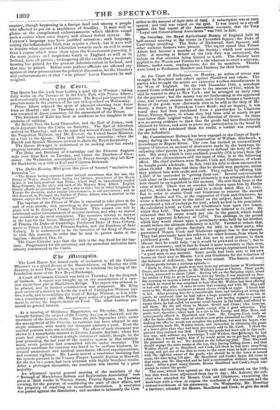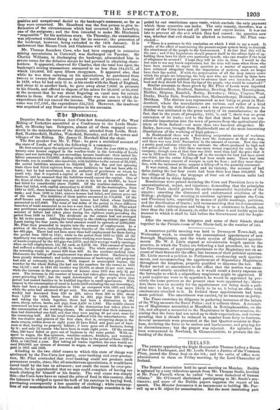gbe liAttropolis.
The Lord Mayor has issued cards of invitation to all the Cabinet Ministers to a grand dinner at the Mansionhouse, on Monday the 17th January, to meet Prince Albert, in order to celebrate the laying of the foundation-stone of the New Royal Exchange.
A Court of Common Council was held on Thursday, for the despatch of business. A report was brought up on the construction of a cast- iron steam-boat pier at Blackfriars Bridge. The report was ordered to be printed, and its further consideration was postponed. Mr. King gave notice of a motion to divide the ward of Farringdon Without into two wards, and to annihilate the ward of Bridge Without, as it is with- out a constituency ; and Mr. Heppel gave notice of a petition to Parlia- ment to revise the Import-duties on Food. The other business pos- sessed no general interest.
At a meeting of Middlesex Magistrates, on Thersday, Mr. Laurie brought forward the subject of the County Asylum at Hanwell, and the treatment of the lunatics there. Since the 29th September 1839, under the management of Dr. Coned's', no restraint has been adopted in any single instance, with nearly one thousand patients a year. Even the suicidal patients were not restrained. The effect of such treatment was shown in a remarkable manner in Lincoln Lunatic Asylum ; where five years had elapsed without a single instance of suicide, though, in the year preceding, the last year of the coercive system in that establish- ment, seven patients had committed suicide under restraint. The salutary substitute for coercion was found to be uniform kindness, in- creased amusement and medical attendance, efficient superintendence, and constant vigilance. Mr. Laurie moved a resolution declaring that the system pursued in the County Pauper Lunatic Asylum at Hanwell, for the last two years, had been attended with highly beneficial results. After a prolonged discussion, the resolution was carried by a great majority.
An adjourned special general meeting of the members of the "Borough of Marylebone Reform and Registration Association" took place at their rooms in Warren Street, Fitzroy Square, on Thursday evening, for the purpose of considering the state of their affairs, and the propriety of resolving on immediate dissolution. A resolution was passed against the dissolution ; and another to indemnify the Corn mittee to the amount of their debt of 2001.- A subscription was at once opened ; and 1001. was raised on the spot It was stated as a set-off against the bad aspect of the Association accounts, that the Tory "Loyal and Constitutional Association" was 700/. in debt.
On Saturday, the Royal Agricultural Society of England held its half-annual meeting at the rooms in Cavendish Square ; the Duke of Cambridge presiding. The Duke of Richmond, Earl Spencer, and other eminent farmers were present The report stated that Prince Albert had become a member of the Society ; which now numbers 5,332. A meeting at Bristol on the 14th July was announced, the tickets on that occasion being limited to 2,400. The Society have applied to the Woods and Forests for a site whereon to erect a museum, library, model-room, reading-room, &c. for its members. Thanks were voted to Professors Henslow and Daubeny for their lectures.
At the Court of Exchequer, on Monday, an action of trover was brought by Shepherd and others against Sboolbred and others. The parties who brought the action are extensive woollen-manufacturers in the West of England. On the 10th December 1840, a merchant named Green ordered goods of them to the amount of 816/., which he said be wanted to ship to New York ; and he arranged an early time for the payment ; but the money was not forthcoming at the appointed time, and various excuses were made, until Green became a bankrupt Some of the goods were afterwards seen to be sold at the shop of Mr. Storey, a draper in Tottenham Court Road ; and on inquiry, it was found they bad been purchased from a pawnbroker in Charlotte Street, Fitzroy Square, to whom they had been sold at nearly 30 per cent below their original value, by the direction of Green. As there was no strong evidence to show that the goods had been fraudulently obtained by Green, and none to prove any participation in the fraud by the parties who purchased them for resale, a verdict was returned for the defendants.
Mr. Commissioner Holroyd has been engaged in the Court of Bank- ruptcy during the week, in the examination of William Hitchcock, a linendraper in Regent Street. The case has excited an extraordinary degree of interest on account of disclosures made by the bankrupt, in- culpating other parties in a gross attempt to defraud the body of-credi- tors. His story, which is very confused, possibly (if it is true) from the nature of the circumstances and the lapse of time, is to the following effect. His chief creditors were Messrs. Cook and Gladstone, of whom he bought goods wholesale. In July 1841 his debt to them amounted to about 19,0001. He then told them that he should stop payment, unless they assisted him with credit and cash. They replied by offering him 2,500/. if he succeeded in "getting them out." Several conversations took place on the same subject ; and ultimately it was arranged that their debt should be extinguished in this manner. He sent them linen to the value of 800/. There was an overdue bill drawn upon him by Heeles and Co., which he bad already paid by a check dated May 15, 1841. But in order to enable Cook and Gladstone to recover the amount against Heeles and Co., at the suggestion of Cook and Gladstone, he wrote a fictitious letter to the latter on the subject, dated back. He surrendered a bill of exchange for 2001., which he had in his possession. He calculated 2,0001. as Cook and Gladstone's loan upon two leases, which they held. The balance would now be reduced to 15,140/. He reckoned that his estate would pay 10s. in the pound, which would leave an apparent deficiency of 7,5701. Ten shillings in the pound which they would obtain upon a promissory-note, held by his brother, would reduce the ultimate deficiency to 3,5701. Further to reduce that, he mortgaged his private furniture for 500/. to a third party, who guaranteed Messrs. Cook and Gladstone against loss to that amount. They had previously been his referees for other houses, from whom he purchased goods. They now told him not to send persons to them oftener than he could help, "as it would be awkward to them"; but to do so if necessary ; and in fact he found it more necessary to than ever, in order to prop his falling credit; and they always represented him to be "a good man to any amount. Some goods had been sent to his own house on their way to Messrs. Cook and Gladstone for the reduction of the balance of deficiency, but they were seized. The history of some of these goods forms a curious episode— "Early in July, the goods were sent from my private house at Westbourne Green, and from other places, to Mr. Walden's house at Chelsea. These goods, I think, amounted to about 1,200/. Having left on the Saturday night, about the middle of July, to go to Cowes to visit my family, I was surprised on Sun- day morning to receive a letter from Mr. Hayward, my confidential manager, in which he stated he was surprised to hear that Mr. Walden had been offering or had sold some silks. I came to town that evening, and with Mr. Hayward went to Mr. Walden's residence at about eleven o'clock at night. I found him in bed. After pressing him for a considerable time, and insisting on seeing the goods, he confessed that he had taken a large quantity of silks to an inn in Holborn, I think the George and Blue Boar ; and having engaged a room or rooms there, he had called on several retail-houses in the trade, and offered to sell them. He did sell them to Messrs. Sewell and Cross; who, however, honourably declined buying the goods except with a good reference. The goods were, therefore, taken back in a cab to the George and Blue Boar, and subsequently offered tr. Shoolbred and Cook. Mr. Gregory Cook made an offer for these silks, the value of which at cost price amounted to 700/. After making the offer he would not complete the purchase, but sent his buyer, who subsequently made Mr. Walden drunk, and succeeded in obtaining the goods at a lower price than they had been previously sold to Mr. Cook. I think the amount they realized was 304/. Finding the goods had been sold in this reck- less way, and without my knowledge, I told Walden, that (although he had robbed me, I would forgive him if he would assist use to get back the goods. He promised to do so. We decided on the following plan. That Hayward should engage the saute rooms at the inn, they having folding-doors ; and that Walden should go to Shoolbred and Cook, tell them he had done something wrong, and get one of the firm to come to the outer room to hold a conference with the rightful owner of the goods, who should be in the inner or second room, the door being left ajar. Mr. Shoolbred and Cook's buyer did come to that room, and Mr. Hayward and he held a conversation without seeing each other. After a good many threats, Messrs. Shoolbred and Cook's buyer con- sented to return the goods."
The case, which was opened on the 6th and continued on the 13th, has this week been adjourned from day to day ; Mr. Ashurst, the soli- citor who attended for Messrs. Cook and Gladstone, examining the bankrupt with a view to expose the confusion of his accounts and the untrustworthiness of his statements. On Wednesday, Mr. Homfray a barrister, attended for Messrs. Shoolbred and Cook, to give the most
positive and unequivocal denial to the bankrupt's statement, so far as they were concerned. Mr. Shoolbred WRS the first person to give in- formation of the circumstances which had occurred to Mr. Lewellyn, one of the assignees ; and the firm intended to make Mr. Hitchcock " responsible " for his malicious story. On Thursday, the examination was adjourned without fixing a day for its renewal ; the protection of the bankrupt, however, being extended to the 16th January. It is understood that Messrs Cook and Gladstone will be examined.
Mr. Thomas Saunders Cave, who had been engaged in extensive mining speculations in Cornwall, was discharged on Tuesday. Sir Charles Williams, in discharging the bankrupt, admonished him in severe terms for the delusive means he had pursued in obtaining share- holders. It appeared, observed Sir Charles, that the total loss upon the bankrupt's mining transactions amounted to no less than 194,0171., of which 120,000/. fell upon fifteen clergymen. It appeared also, that while he was thus carrying on his speculations, he purchased from twenty to twenty-four thousand pounds' worth of pictures ; and that, in 1838, when be had only 1/. 4s. at his credit with the Bank of England, and about 4/. in another bank, he gave away about 7,000/. in presents to his friends, and offered to dispose of his mines for 20,000/. or 30,000/. at the moment that he was about fingering an equal sum for certain shares in them. Out of eleven mines, there was not one in which the expenditure did not exceed the income. The gross amount of the in- come was 157,1001., the expenditure 355,7211. However, the insolvent was acquitted of any fraud or deception in his accounts.



























 Previous page
Previous page